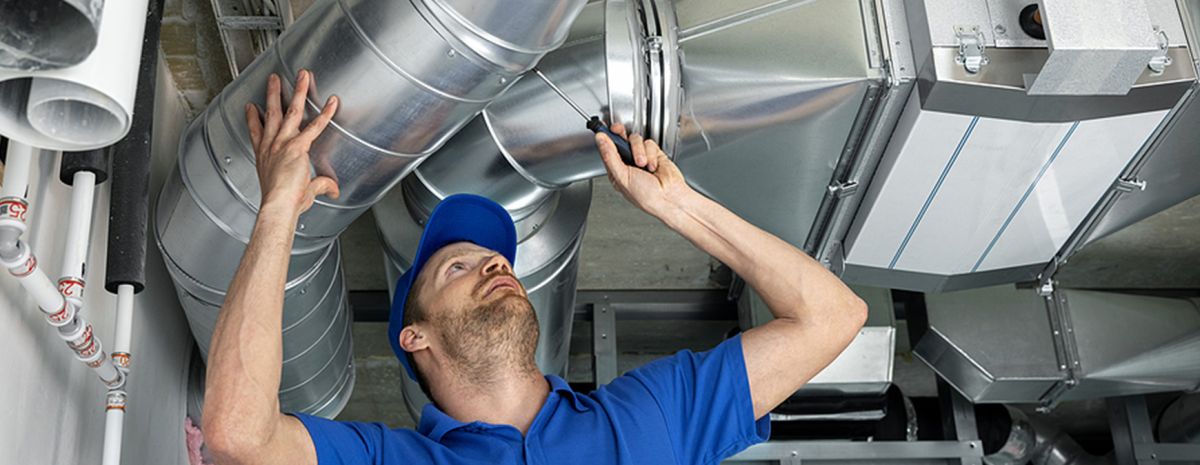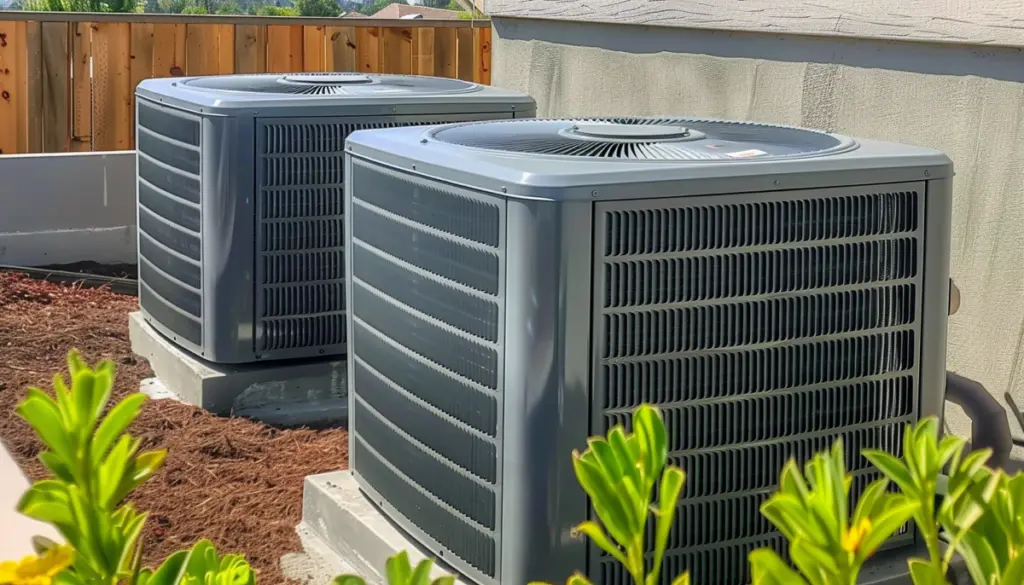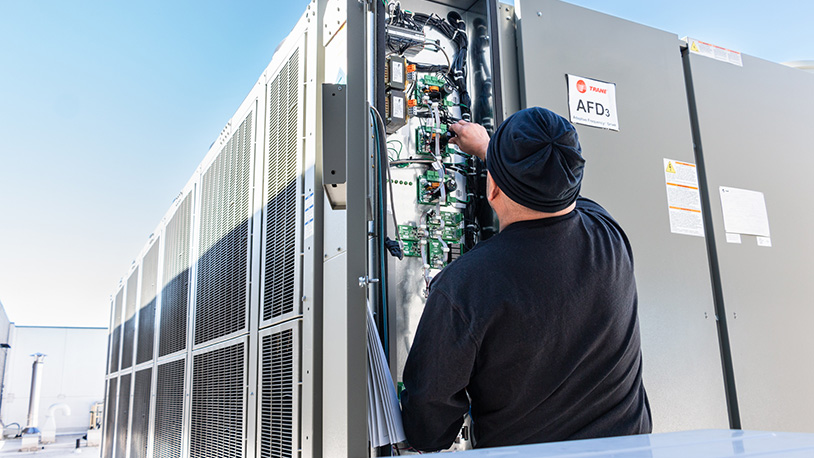Discover how HVAC experts support office building comfort needs
Wiki Article
Checking Out the Vital Elements of an Efficient Heating And Cooling System
An effective cooling and heating system is improved numerous important elements that operate in consistency. Each part, from the thermostat to the ductwork, plays a vital duty in preserving convenience and power effectiveness. Understanding these elements is important for enhancing performance and improving interior air top quality. As one takes a look at these elements, the complex relationships in between them disclose understandings into improving overall system effectiveness. What details factors contribute most to this performance?The Role of the Thermostat in A/c Efficiency

Often overlooked, the thermostat plays an important duty in the efficiency of Cooling and heating systems. This little device functions as the primary nerve center, managing temperature level setups and making sure perfect comfort within a room. By properly sensing the ambient temperature level, the thermostat interacts with the air, ventilation, and heating conditioning devices to keep the wanted climate
An effective thermostat lessens power usage by turning on the HVAC system just when necessary, thus avoiding too much home heating or air conditioning. Modern programmable and clever thermostats improve this performance additionally by enabling customers to establish routines and remotely readjust settings, adjusting to daily regimens.
Moreover, the placement of the thermostat is necessary; inappropriate area can lead to incorrect temperature level readings, resulting in ineffective operation. In general, a well-functioning thermostat not just improves comfort however also contributes noticeably to power cost savings and the longevity of the cooling and heating system.
Comprehending the Value of Air Filters
Air filters serve a vital function in a/c systems by guaranteeing that the air circulating within a room stays clean and healthy and balanced. These filters catch dirt, irritants, and various other toxins, preventing them from being recirculated throughout the setting. By recording these particles, air filters add to boosted indoor air high quality, which can greatly profit occupants' health and wellness, especially those with allergies or respiratory conditions.In addition, keeping clean air filters enhances the performance of heating and cooling systems. Blocked filters can limit air movement, triggering the system to function more difficult to maintain preferred temperatures, resulting in boosted power usage and higher utility costs. Routinely changing or cleansing filters is a crucial upkeep action that can prolong the lifespan of cooling and heating tools. Inevitably, recognizing the relevance of air filters allows property owners and building supervisors to take aggressive measures to assure a well-functioning, reliable heating and cooling system that promotes a risk-free and comfy interior environment.

The Performance of the Furnace and Heatpump
Furnaces and heatpump are important components of a/c systems, in charge of supplying heat throughout cooler months. Heaters operate by heating air with burning or electric resistance, then distributing it throughout the home by means of air ducts. They commonly use fast home heating and can be fueled by gas, power, or oil, relying on the system kind.On the other hand, heatpump transfer warmth as opposed to create it. They remove warmth from the outside air or ground, also in reduced temperature levels, and move it indoors. HVAC experts. This double functionality permits warmth pumps to additionally supply cooling in warmer months, making them functional choices for year-round climate control
Both systems require proper maintenance to assure effectiveness and long life. While heaters excel in severe chilly, heatpump can be helpful in moderate climates. Understanding their distinct performances aids house owners in picking the most appropriate option for their home heating needs.
Discovering the Air Conditioning Unit
The air conditioning unit is an essential part of a/c systems, readily available in various kinds to match different needs. Comprehending the effectiveness scores of these units is essential for making educated options about energy intake and expense. This section will certainly check out the varied types of a/c unit and clarify exactly how performance rankings effect performance.Kinds Of Air Conditioners
While different factors influence the selection of a/c systems, understanding the different kinds offered is crucial for property owners and building managers alike. Central air conditioners are developed to cool whole homes or structures, using a network of air ducts for air movement. Home window units offer a more localized remedy, suitable for tiny spaces or single rooms. Mobile a/c supply flexibility, permitting customers to move the device as required. Ductless mini-split systems are an additional choice, incorporating the efficiency of central systems with the benefit of zoning, as they call for no ductwork. Geothermal systems harness the planet's temperature for energy-efficient cooling. Each type includes distinct advantages, making informed selections essential for effective environment control.
Effectiveness Scores Described
Understanding effectiveness scores is vital for selecting the appropriate a/c unit, as these metrics provide understanding into the system's efficiency and energy intake. One of the most common score for air conditioners is the Seasonal Energy Efficiency Proportion (SEER), which measures the cooling outcome during a typical cooling period split by the overall electric power input. A higher SEER suggests far better performance. Additionally, the Energy Effectiveness Ratio (EER) is utilized for determining effectiveness under certain conditions. Another crucial metric is the Energy Star certification, which signifies that an unit satisfies strict power effectiveness standards. By reviewing these scores, customers can make enlightened selections that not just optimize convenience but likewise decrease energy expenses and ecological effect.The Relevance of Ductwork and Airflow
Efficient ductwork style and air flow monitoring play critical roles in the overall effectiveness and performance of a/c systems. Correct ductwork warranties that conditioned air is dispersed evenly throughout an area, lessening temperature level variations and improving convenience. Properly designed air ducts decrease resistance to airflow, lowering the workload on heating and cooling devices and ultimately decreasing power consumption.Air flow management includes purposefully placing vents and signs up to boost the circulation of air. This avoids typical problems such as cool or hot places, which can take place when air movement is blocked or improperly well balanced. Additionally, the best air duct materials and insulation can additionally boost effectiveness by minimizing heat loss or gain during air transit.
An efficient ductwork system not only adds to energy savings but can additionally extend the lifespan of heating and cooling devices by lowering unnecessary pressure (HVAC experts). Consequently, understanding the click here significance of ductwork and air movement is essential for attaining peak HVAC system efficiency
Routine Upkeep Practices to Enhance Performance
Normal upkeep techniques are vital for making certain peak performance of HVAC systems. These techniques include routine evaluations, cleaning, and needed repair work to keep the system running efficiently. Regularly changing air filters is crucial, as stopped up filters can obstruct air flow and lower efficiency. Furthermore, specialists should examine and tidy evaporator and condenser coils to protect against getting too hot and energy wastefulness.Annual specialist assessments are additionally recommended, as trained specialists can determine prospective concerns before they intensify. Lubing relocating components minimizes damage, contributing to a longer life expectancy for the system. Furthermore, making certain that the thermostat functions properly help in keeping optimal temperature control.

Frequently Asked Questions
Just how Often Should I Replace My Thermostat?
Thermostats must typically be changed every 5 to ten years, depending on use and technology advancements. Normal checks are suggested to ensure peak efficiency, specifically if experiencing irregular temperature level control or raised power costs.What Size Air Filter Is Finest for My Cooling And Heating System?
The very best dimension air filter for an a/c system differs by device design. Typically, it's essential to seek advice from the proprietor's guidebook or inspect the existing filter dimensions to guarantee peak efficiency and air top quality.Can I Set Up a Heatpump Myself?
Installing a warmth pump independently is possible for competent people, however it requires expertise of electric systems and neighborhood codes. Employing a specialist is suggested to ensure proper setup and suitable system performance.Exactly how Do I Know if My Ductwork Is Effective?
To determine ductwork performance, one must look for leaks, action air flow at vents, check insulation quality, and review temperature level distinctions in between supply and return air ducts. Expert assessments can provide detailed insights right into total performance.What Are Indications My HVAC Demands Immediate Maintenance?
Indications that a cooling and heating system needs prompt maintenance consist of unusual noises, irregular temperatures, enhanced power bills, undesirable odors, and frequent cycling. Addressing these issues without delay can stop additional damage and assurance height system efficiency.Air filters serve a crucial function in Cooling and heating systems by guaranteeing that the air distributing within an area remains tidy and healthy. Furthermore, maintaining tidy air filters enhances the efficiency of A/c systems. Ductless mini-split systems are an additional choice, incorporating the performance of central systems with the ease of zoning, as they call for no ductwork. Recognizing performance ratings is important for picking the appropriate air conditioning device, as these metrics supply insight right into the system's performance and energy intake. The best size air filter for a Cooling and heating system differs by unit layout.
Report this wiki page